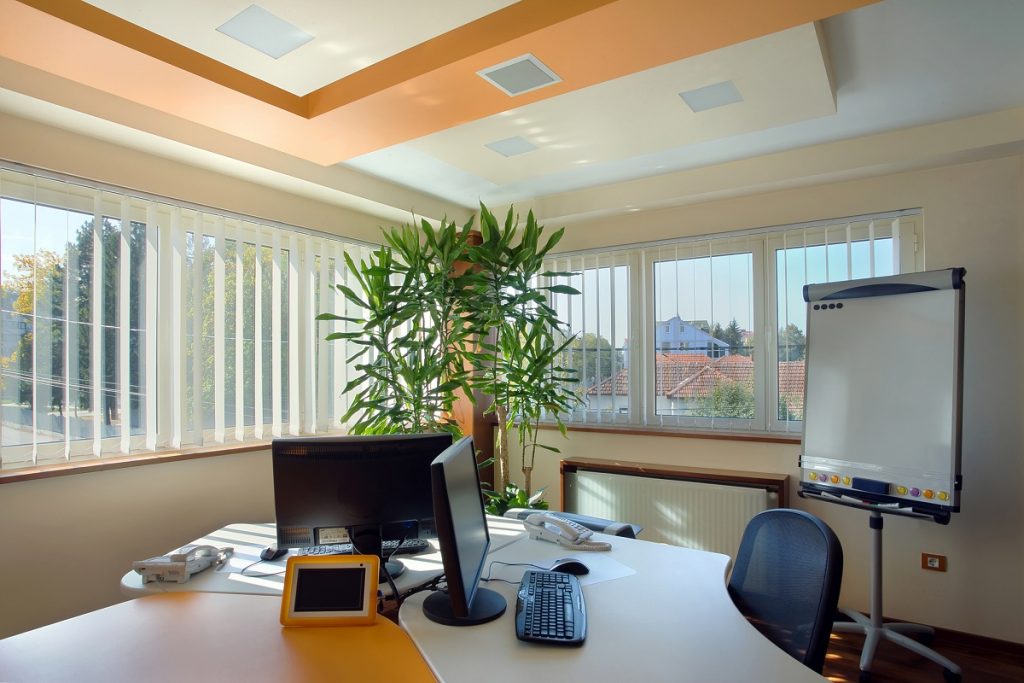You probably use the principles of Feng Shui on a regular basis anyway, without being conscious of it. Feng Shui is the ancient Chinese art of having your environment planned and arranged in such a way as to maximize the flow of energy or creativity.
Its ideas and principles can be applied to just about any room in the house, in the placing and juxtaposition of furniture, ornaments and pictures, but it is especially important in a workplace or office. Correctly applied, the basics of Feng Shui can help to ensure a more relaxed, yet productive working environment.
Office desk position
One of the most important factors is the position of your office desk – the ideal position is one in which the desk provides you with a view out of the window as well as a direct view of your door. A wall directly behind your desk provides stability; and will also help to induce a feeling of power and control.
You may not give much thought to the shape of your office desk, but this can make a huge difference – a desk with round corners or curves can help to encourage creativity, whereas a kidney-shaped desk can supposedly help to lead to a feeling of contentment. Try to avoid sitting with a window behind you, which signifies a lack of support.
Once you have your office desk properly situated, it’s just as important to ensure that it is kept free from clutter. An in-tray that is overflowing, or a desk that is drowning in paperwork can overwhelm you and make it difficult to concentrate on anything.
Feng Shui exponents point out that an untidy and cluttered desk or working environment is an indication of a crowded or overwhelmed mind. You probably want some nick-nacks and personal items on your desk, but keep them to a minimum – too many can prove to be distracting.
Plants are important in the office – the green color can help to encourage creativity – although try to avoid sharp plants which gather negative energy. If possible, place plants in corners, spaces that usually tend to be empty. By Feng Shui that will help to stimulate a positive energy flow.
If you have any other contemporary furniture in your office, it should be chosen and positioned with care. Any tables and chairs should be placed to ensure an easy flow between them; this also helps to create harmony.
Feng Shui practitioners also advise that certain objects – photocopy machine, paper-cutter – should not be located next to the door, as the constant opening and closing of the door will help to disperse any positive energy. An indoor fountain is considered an excellent source of positive energy, as well as being pleasing to look at.
Influencing mood by color
As most of us instinctively know, color is important when it comes to influencing our mood. If your job is typically hectic and stressful, a calming color such as light green will help to relax you. If your work involves trying to close a sale, or negotiate a deal, red is a power color in Feng Shui; it can help to give you a boost or inspire confidence.
An office or workspace that is brightly colored can help to energize and invigorate you. And don’t forget the positive effect of artwork or photographs which should be carefully chosen to inspire and encourage you – pictures of family or a dream destination, any certificates and diplomas, etc.
If you are lucky enough to work from home, you probably already know how important it is to have a suitable working environment. Ideally, your office should be completely separate from your home environment – a separate room is perfect; if you don’t have the space for that, make sure it is partitioned or screened off.
A home office should not be in the bedroom, thus ensuring that work distractions don’t subconsciously keep you awake at night; in fact it should be as far away as possible from the bedroom. Your workspace should be well lit, roomy and inviting – a dark or cramped space won’t inspire you. Many of us tend to dismiss Feng Shui or not take it seriously, but properly applied, it can be a powerful tool.

